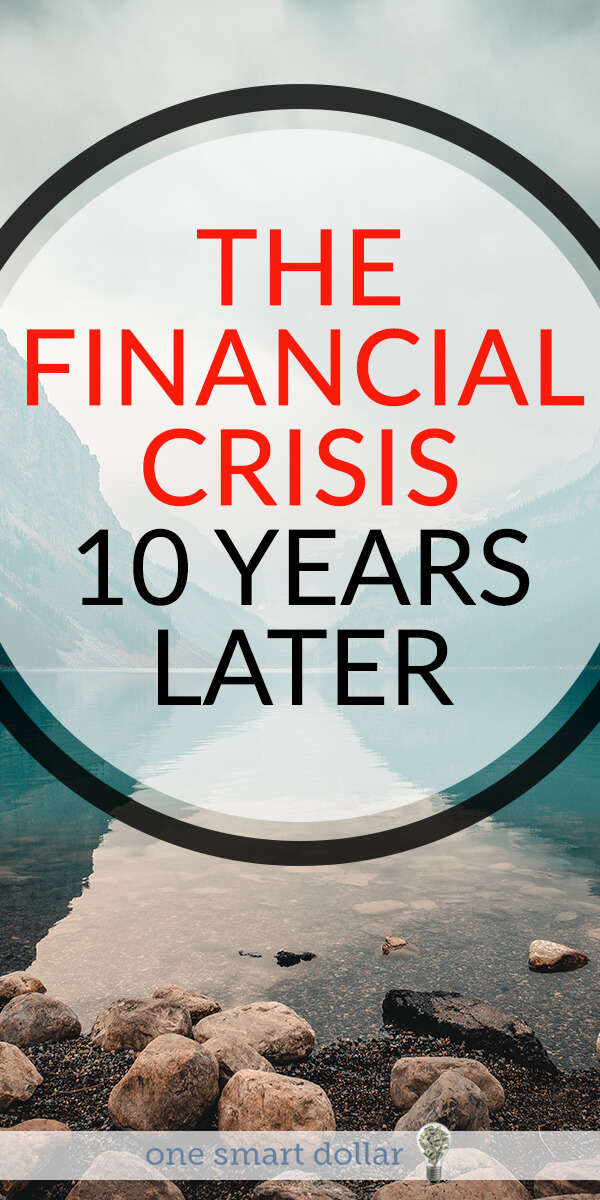How are Your Finances Now?
A decade has passed since we saw one of the biggest financial downturns in recent history. But it started long before that market collapse.
Banks were handing out subprime housing loans to people who weren’t financially secure enough to have a loan of that magnitude. The result was a cascading effect of foreclosures, stock market drops, and Lehman Brother, one of the largest banks, closing its doors.
So where are we now? The market has been strong, posting huge gains. Unemployment is at an all-time low, and the housing market has rebounded. We’re back on track and wealthy again, right? It all depends on who you are, where you are in your financial journey, and what you have done since the market collapses and was rebuilt.
Finances 10 Years Ago Compared to Today
Millennials get a lot of flack from just about everyone (including other millennials). The truth is that this generation, and by some accounts, I’m one, fell into precisely the wrong time period from a financial point of view.
10 years ago, as the market was in a downspin, many millennials were just starting their careers. Suddenly they had to deal with massive layoffs, companies downsizing or shutting their doors, and a market that wasn’t appealing to invest in.
There is a method of investing that has been preached by financial experts for quite some time: buy and hold. When you try to time the market, you end up missing out on some of your gains, and for the most part, you end up losing more.
When the market started going down, I didn’t have a lot invested. But I knew that being in my mid-20’s at that time, I had a lot of time until I would need the money, so I left it as it is. Now, 10 years past the beginning of the recession, we can look back and see what happened.
Suppose you had $10,000 invested when the market was at its peak in 2007, your portfolio (assuming no additions) would have dropped to roughly $4,500 by March 2009 when the market bottomed out. Leaving your money invested through the downturn, and subsequently, through the gains over the last nine-plus years, you would now have $23,000 (including any dividends that were reinvested). That is roughly a 7.75% rate of return; not bad for losing over half of your money in a 16 month period.
Who Has Fared Better?
The recession hit all generations hard. Those who were approaching retirement, or who had just entered it, felt some of the most severe impacts as they had to completely adjust their plans.
Younger generations, those who have plenty of time before they need to draw on their money, fared a bit better. Like me, they had to watch their account values drop, but then watched them steadily climb back since 2009.
But there is a group that has done remarkably better than others. This group isn’t limited to age, sex, or location. It’s a group that was able to adjust their attitude to the current economic situation. They understood that housing costs and college tuition have gone up considerably, and they acted accordingly.
It’s a group that threw themselves into the workplace and didn’t limit themselves to just one job. They took on side hustles, earned money while “off the clock”, and committed themselves to save more and getting into less debt. These are those that choose not to become a victim of the economy, but to master their own economic situation.
But we still aren’t Optimistic
Unemployment is at an all-time low while the stock market is at an all-time high. So why do most people still feel on edge about the future of the economy?
Wages are still low. Inflation has outpaced minimum wage (which “should” be over $10/hr if it had kept up since 1968). Costs of living have far outpaced income earned. As a whole, younger generations are having a lot harder time getting their feet on the ground. More people are still living at home, even into their late 20’s and early 30’s, because they haven’t been able to build their financial foundation enough to make the plunge.
The silver lining to this pessimistic view of the future of the economy: people are being smarter with their money. Because younger generations are living at home longer, they are able to save more money (presumably with the idea that it will ultimately go toward a down payment on a house).
Because we are intent on saving for homes and bigger purchases, smaller consumer debts have been kept to a minimum. More people have avoided accumulating charges on their credit cards, financing smaller automobile loans, and overall improving their net worth; although it could be as a “just in case” this all happens again.
The Future of Finances in the US
It’s hard to predict where the economy will go until just before it moves. There are some analysts that are right about long-term predictions, but many more that are wrong. Here’s what we do know: the market goes up, and the market goes down. So how do you protect against it? My methods are relatively simple:
Have an emergency fund – Fund it by finding a side hustle, donating plasma, scrimping on lattes, or whatever means necessary.
Build or Repair your Credit – One of the best ways to grow your net worth is to leverage your debt. But you first need to have good credit. If it’s not there, you can build it; if it’s bad, you can do a credit fix.
Invest as much as possible – Use an app like Acorns to make it easier, automate your IRA, refinance your loans to lower your interest and invest the difference.
Work harder and smarter – Find a way to make money on the side, and then work hard at it. Perfect your skills, raise your prices and negotiate raises at your nine to five.
The next market correction will make your account values drop. When they do, invest more.


